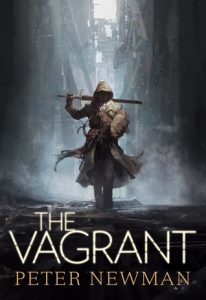The Vagrant by Peter Newman
 “Actions speak louder than words.”
“Actions speak louder than words.”
I heard Peter Newman speak at the Grim Gathering II in Bristol, where he gave a short summary of his book: “A one parent family in a post-demonic apocalypse.” Look closely at the exquisite cover and you will see the key elements in this tale. A ragged man with a sword in one hand and a baby in the other, walking a street of ruined buildings above a title set out in neon lights. Before the first page is turned, The Vagrant is challenging expectations.
There is a storyline, and a back-storyline. By the end, the latter has converged pleasingly on former to explain all things that need explaining. But it is the spare writing and the exoticness of the world building that carried me along.
In some ways, The Vagrant reminded me of The Gunslinger by Stephen King with its iconic mental image of an enigmatic hero on an unexplained journey through a blasted land. This is a world not so much stalked as comprehensively mugged by disaster on an epic scale. On a long walk, the protagonist acquires a staggering variety of both allies and enemies.
However, The Vagrant is more complete and self-contained than the first instalment of the Dark Tower series. At the Grim Gathering, the author said he always had a beginning and an end in mind, with a misty patch in between where pretty much anything could happen. That over-arching certainty guides the Vagrant’s footsteps and reassures the reader that there is purpose in the present and resolution in the future.
The world building is broad and imaginative, in that not just one but two worlds are conjured up before the reader. There is the world that was – a world destroyed, the advanced civilisation where ships sailed in the sky and tanks like armoured trains went to war with demons, where knights still wielded swords in harmony and the mysterious power of the Seven, with their great champion Gamma, stood ready and on ceaseless and unchanging watch against invasion from the Breach.
Then there is the world that is. A world infested with entities which enslave the humans from without and within. Creatures of chaos flood north across a now benighted continent. Their power is constrained only by infighting between their factions and the necessity of finding ways to shield themselves from the toxic environment where they have won victory. These demons are unlike any others, creatures of essence and desire rather than corporeal entities. More an infection than an invasion, they corrupt as much as conquer. A taint stains the land and its people.
My other reference point is a 1981 film Mad Max 2, the (original) road warrior. There is that atmospheric journey through a shattered civilisation in which little islands of humanity strive to eke out some shadow of their former existence. Broken technology is cannibalised by desperate people as the Vagrant travels North past a barren landscape of twisted plastic and metal on a mission both personal and professional.
The people have been crushed by defeat, and by taint. Things that were, or could have been human, have been corrupted beyond recognition. But still sparks of humanity and honour reside in the unlikeliest of places and can be kindled anew in a world where there is hope for all, and tears for those that fall.
The story is told in the present tense, even the backstory flashbacks. It is an approach still unusual to my old eyes. However, I saw it done to great effect in The Girl With All The Gifts, and here – as there – the present tense narrative lends an edgy uncertainty as we follow our hero through a tale augmented with a variety of minor points of view (including a goat’s uncomplicated eye).
The writing is unobtrusively good. Like Mark Lawrence, Peter Newman avoids battering you with purple prose, or savouring its cleverness in convoluted gymnastics of vocabulary. But open a page at random and you will find lines that make you nod in appreciation. (“Mist leaking in wheezy clouds”; “Busy clots of people move about.”)
The final departure from convention, or perhaps the first, is in the protagonist’s voice. For Newman has determined that, for the Vagrant, actions must perforce speak louder than words.
